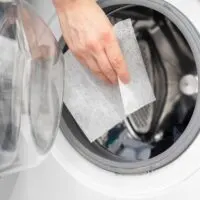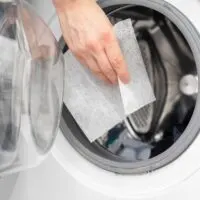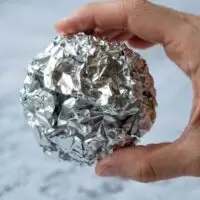
For millions of people, tossing a dryer sheet in with their laundry is just another part of the process. That fresh, clean scent and soft clothes fresh out of the dryer might seem comforting, but there’s a hidden side to these seemingly harmless sheets.
Dryer sheets may promise softness and a pleasant fragrance, but the reality is that they’re packed with chemicals that could be doing more harm than good. Those pretty flower images on the packaging? They’re not as innocent as they appear. Instead, these products could be contributing to health issues that many people aren’t even aware of.
Let’s dive into why dryer sheets might be more dangerous than you think and explore some easy alternatives for a healthier laundry routine.
What’s Really Inside Dryer Sheets?
Most dryer sheet boxes boast claims of softness, fresh-smelling clothes, and static control. But what you won’t find is a full list of what’s actually in them. Manufacturers aren’t required to disclose all the chemicals they use—especially those hidden in fragrance blends.
Research shows that dryer sheets often release harmful chemicals into the air. Environmental expert Dr. Anne Steinemann conducted a study that looked into dryer vent emissions from scented products. What she found was eye-opening: chemicals like acetaldehyde and benzene, both linked to serious health problems, were being released from dryer sheets into the air.
These emissions don’t just affect your home; they also add to outdoor pollution. In fact, the acetaldehyde released from scented laundry products contributes to about 6% of what comes from car emissions. That’s a lot of harmful chemicals coming from something that’s supposed to make clothes smell “clean.”
Health Risks Linked to Dryer Sheets
The chemicals found in dryer sheets don’t just stay on your clothes—they end up in the air and on your skin, leading to potential health problems. One of the key offenders is acetaldehyde, which is a common ingredient in artificial fragrances. Classified as a “potential carcinogen,” it can affect the kidneys, nervous system, and respiratory system.
Research by Dr. Steinemann also highlighted how many people report experiencing health issues from the use of scented laundry products. These include symptoms like respiratory problems, migraines, skin irritation, and even gastrointestinal discomfort. In fact, more than 12% of people blame their health issues on the emissions from dryer vents. That’s a significant number of people unknowingly being exposed to harmful substances.
It’s not just about personal health either—these chemicals can impact the environment. When dryer sheet pollutants are released into the air, they contribute to overall pollution levels in neighborhoods and public spaces. Essentially, the use of these products goes beyond individual exposure and creates a wider environmental problem.
The Chemicals Behind the Scents
The pleasant smell from dryer sheets might seem harmless, but it’s often the result of a mix of volatile organic compounds (VOCs) and other harmful chemicals. One of the most common chemicals found in these products is acetaldehyde, which, as mentioned earlier, is a known carcinogen. But that’s just one of many.
Studies have revealed that dryer sheets can release up to 25 different VOCs into the air, including benzene and formaldehyde—both of which are linked to long-term health problems. Benzene, in particular, is known to cause cancer, while formaldehyde is often associated with respiratory issues and skin irritation.
Beyond these immediate dangers, there are also concerns about long-term exposure to these chemicals. The buildup of harmful substances in the body over time can lead to more severe health problems, especially for individuals with pre-existing conditions like asthma or allergies.
Safer Alternatives to Dryer Sheets
The good news is, ditching dryer sheets doesn’t mean sacrificing fresh-smelling, soft clothes. There are plenty of natural and safe alternatives that can get the job done without all the harmful chemicals.
- White Vinegar: Adding a quarter cup of white vinegar to your washer’s rinse cycle can help reduce static and soften fabrics naturally. It’s a simple solution that’s both affordable and effective.
- Wool Dryer Balls: These reusable balls not only help reduce drying time, but they also soften fabrics and decrease static cling. For a light scent, a few drops of essential oils like lavender or peppermint can be added to the balls before use.
- Line Drying: If possible, hanging clothes outside to dry is a great way to avoid using any dryer sheets altogether. Plus, it saves energy and gives clothes that natural fresh-air smell.
- DIY Laundry Detergent: Consider making your own detergent using natural ingredients like castile soap and baking soda. This way, you can control exactly what goes into your laundry routine.
- Fragrance-Free Products: If you still prefer using commercial products, look for unscented, plant-based options. Be cautious of “green” products, though, as some may still contain hidden chemicals.
Making small changes like these can go a long way in keeping your home free from unnecessary toxins and protecting both your health and the environment.

Are Dryer Sheets Really Necessary?
While dryer sheets are often seen as a laundry essential, it’s worth asking if they’re truly needed at all. Historically, laundry was dried and softened without the use of synthetic products, and modern washing machines and dryers are efficient enough to reduce wrinkles and static naturally.
In fact, many experts agree that dryer sheets are more of a convenience than a necessity. Relying on these products is largely a matter of habit rather than actual need, and moving away from them can improve both health and sustainability without sacrificing the quality of laundry results.
A Cleaner Laundry, A Healthier You
While dryer sheets may seem like a small part of the laundry routine, their impact on health and the environment is anything but minor. With harmful chemicals hiding in their pleasant scents, it’s worth reconsidering their use and opting for safer, natural alternatives.
By making simple swaps like using wool dryer balls or white vinegar, it’s possible to keep laundry fresh and soft without compromising well-being. In the end, a healthier laundry routine means a healthier home—and a cleaner planet.



